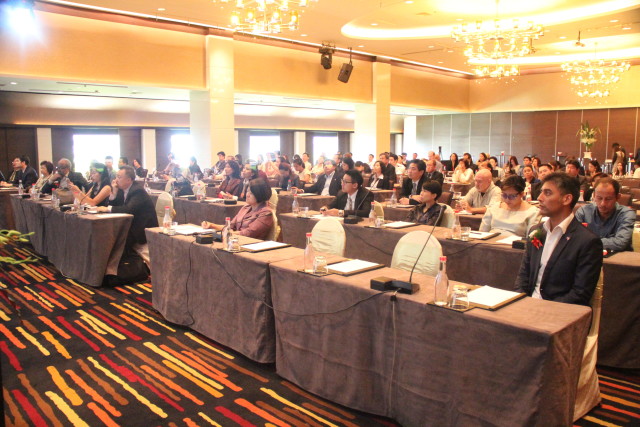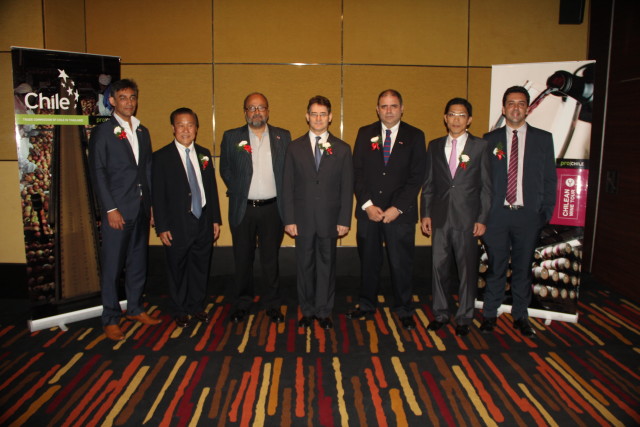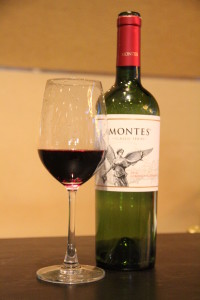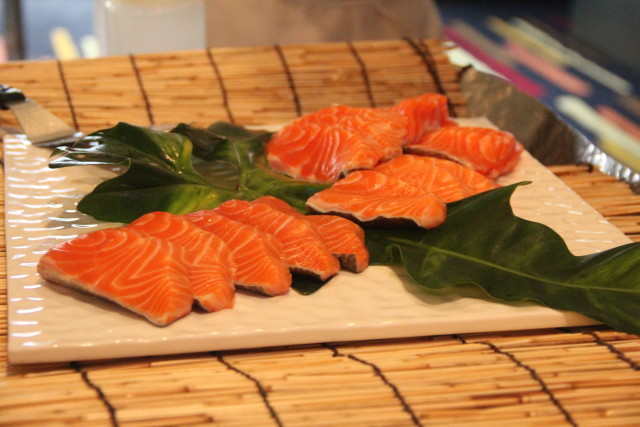If you appreciate Chilean wines, because of their easy-going approach, and good value for money, you have some to celebrate about, as the date for the entry in force of the Free Trade Agreement (FTA) between Thailand and Chile gets closer.
Chilean governmental officials and business people visited Thailand this week to hold meetings with their counterparts, and to participate in the seminar “The FTA Between Thailand and Chile, Starting a New Period of Prosperity” and the “Bites of Chile” lunch, which took place on Wednesday at The Landmark Bangkok.
As explained by the Chilean Trade Commissioner to Thailand, Diego Osses, “the FTA between Chile and Thailand was signed by presidents Pinera from Chile and Shinawatra from Thailand on October 2013, and was finally approved by the Chilean Congress last month. More than 90 percent of the goods traded between both parties will benefit immediately with zero tariff, while the rest will gradually reduce to zero tariff in a period of three, five, or eight years.” According to Osses, both countries are currently discussing the best venue and date to sign the entry in force, an event that will allow the publication of the agreement in both official gazettes. “Sixty days after that publication, the importers and distributors from both Thailand and Chile will start receiving the benefits. We estimate that the implementation of the FTA should occur during the first months of 2016,” he added.
“As suggested by the name of this seminar, it is indeed the start of a new period of prosperity, for the benefits of this FTA would extend far beyond the boundaries of our two countries,” said Kanit Si, Chairman of the Thai-Chilean Joint Business Council. “The trade between Thailand and Chile has grown from around USD 460 million in 2007 to over USD 1 billion in 2014, with Chile exporting raw materials into Thailand––such as copper and wood pulp––and Thailand exporting manufactured goods––such as pickup trucks and automobiles––to Chile. This means tremendous potential for further economic cooperation and, for Thailand, Chile is the gateway to Latin America, connecting us to countries like Mexico, Colombia, Argentina, and Brazil.”
Kanit Si added that, in order to boost trade and investment between both countries, it would be important that goods that benefit Thailand and Chile more (such as seafood and cement, among others) are liberalized first; that non-tariff barriers (such as customs entry procedures and tax collection processes) are eliminated; and that incentives for foreign investment (such as increasing the limit of foreign ownership, easing business visa requirements, and providing the right to transfer funds out of the country at any time) are put in place.
Other presenters at the FTA seminar besides Osses and Si were H.E. Javier Becker, Ambassador of Chile to Thailand; Roberto Paiva, ProChile’s Chairman; Rafael Sabat, Head of ProChile’s International Department; Passavudh Rimcharone, Minister Counselor for the Thai Ministry of Commerce; and international lawyer and market advisor, Jose Herrera. More than 100 business people––including government representatives, as well as local importers and distributors––attended the seminar, confirming the interest of Thailand’s public and private sectors in this agreement and its future benefits.
 “Thailand and Chile’s economies complement very well – that’s why we negotiated an FTA. While Chile is interested in purchasing products from Thailand, such as food and machinery, Chile (mainly with its food products, like seafood and wine) would like to strengthen its presence in the ASEAN market,” explained Sabat. “We are all very excited about the entry in force of this agreement, because business is already developing well between both countries, and what usually happens with FTAs is that, particularly in their first years, business between the concerned parties increases even more,” he added.
“Thailand and Chile’s economies complement very well – that’s why we negotiated an FTA. While Chile is interested in purchasing products from Thailand, such as food and machinery, Chile (mainly with its food products, like seafood and wine) would like to strengthen its presence in the ASEAN market,” explained Sabat. “We are all very excited about the entry in force of this agreement, because business is already developing well between both countries, and what usually happens with FTAs is that, particularly in their first years, business between the concerned parties increases even more,” he added.
ProChile, an institution of Chile’s Ministry of Foreign Affairs in charge of promoting exports of the country’s products and services, also celebrated its annual coordination meeting for Asia this week at Sofitel Bangkok Sukhumvit, where all the trade commissioners in the region gathered to discuss their action plan for 2016. “Asia is the most important market for Chilean exports, starting by China, Japan, and Korea. ASEAN is also very important and has a lot of potential, that’s why we are here,” said Roberto Paiva.
Foods from Chile
In the context of ProChile’s “Foods from Chile” campaign––launched in 2013 and expected to have a larger presence in Asia and the rest of world in 2016––and to showcase the food safety, traceability, global compliance, quality, and pure taste that define Chilean products according to this campaign, attendees to the seminar could also try Chilean white and red wines, as well as a variety of Chilean dishes such as cheese empanadas (turnovers) with shrimp and mussels, salmon ceviche with red dried chili and quinoa, baked salmon and giant squid chupe (casserole) au gratin, among others prepared with Chilean products available in Thailand.
For more information visit ProChile or FoodsfromChile.



 0
0